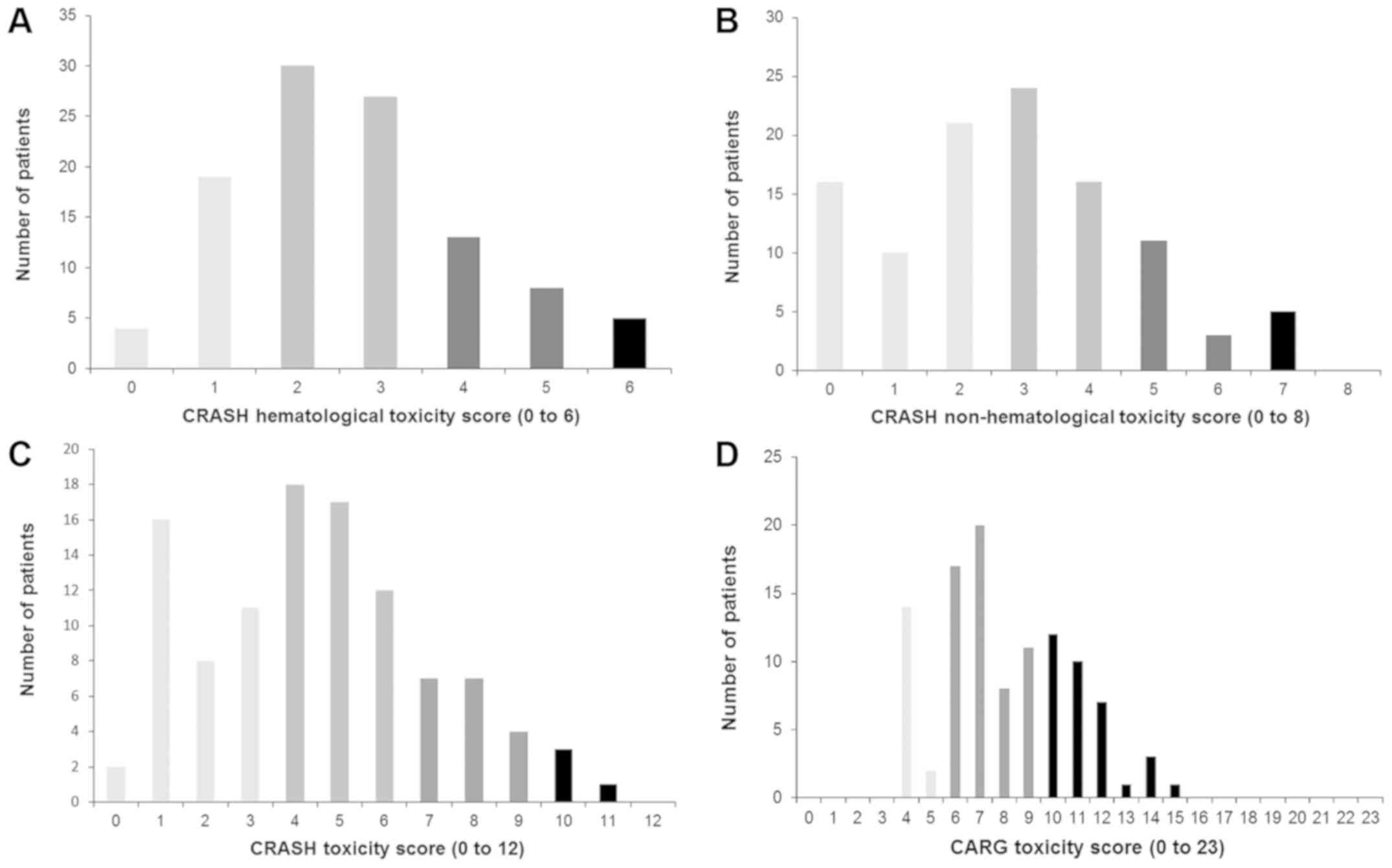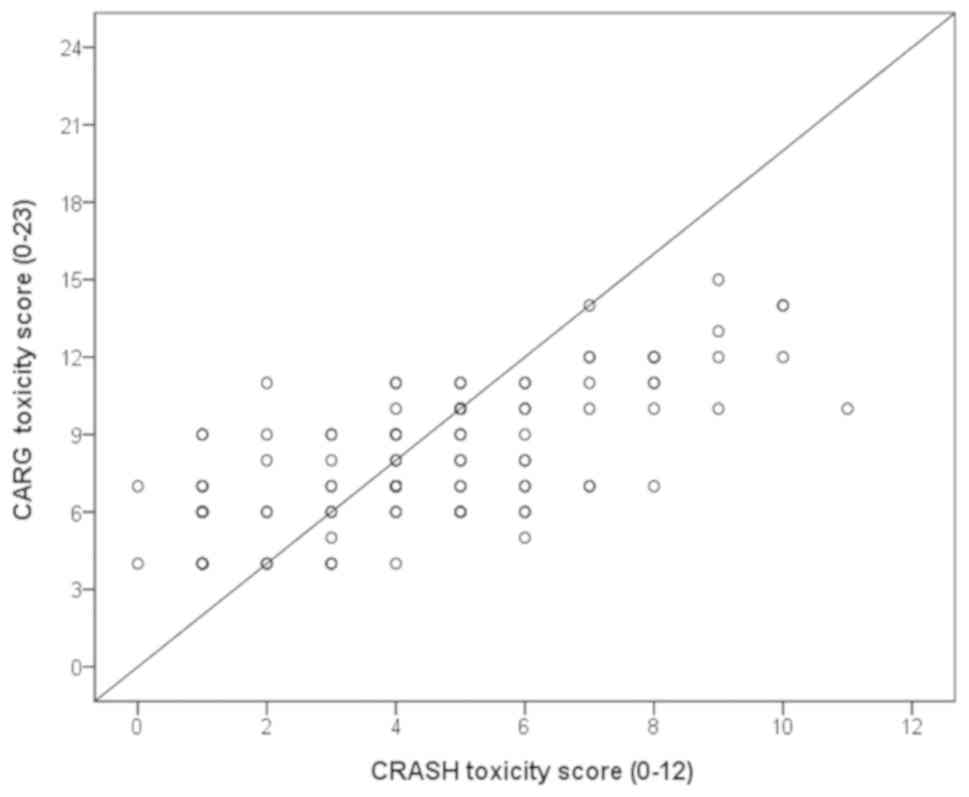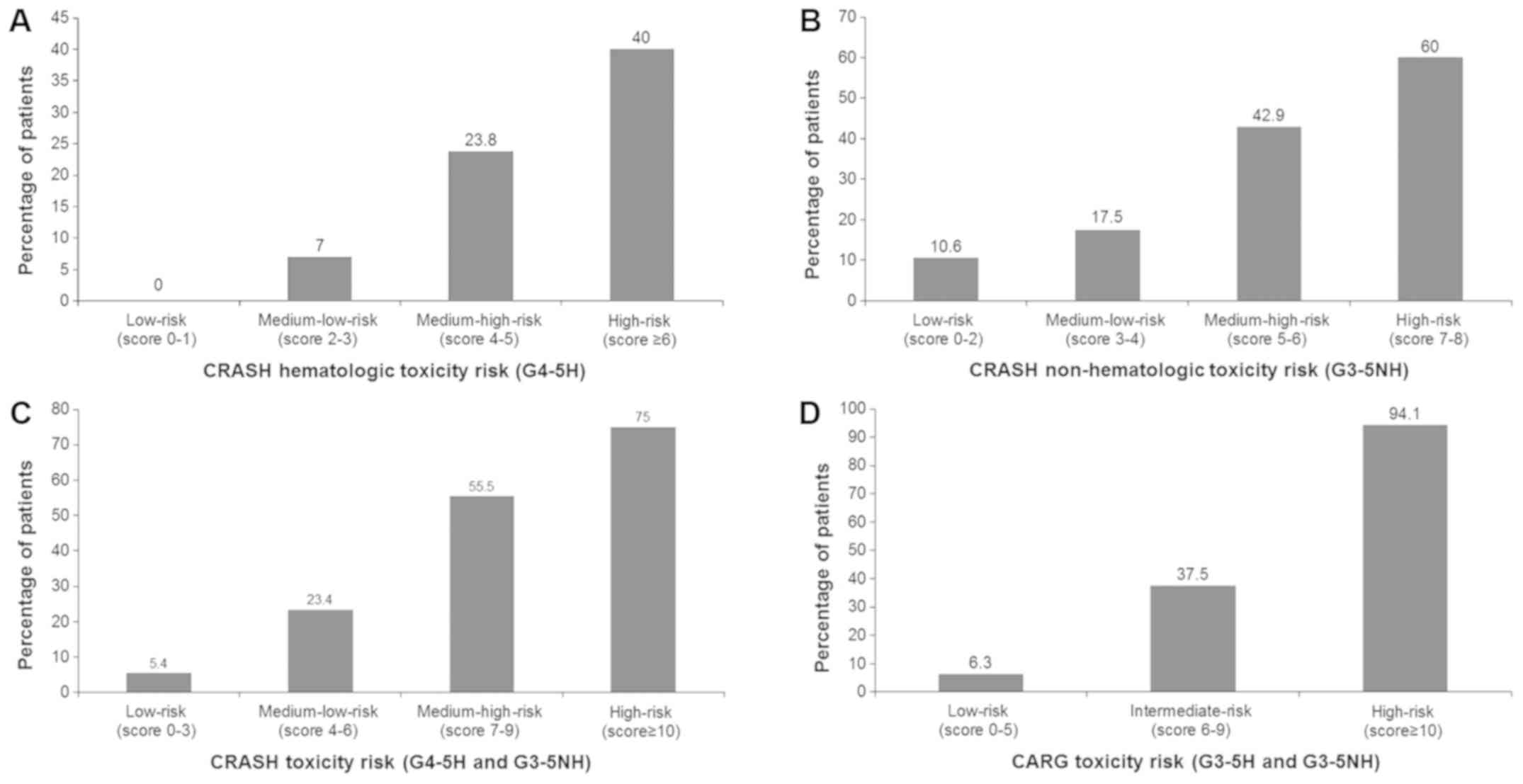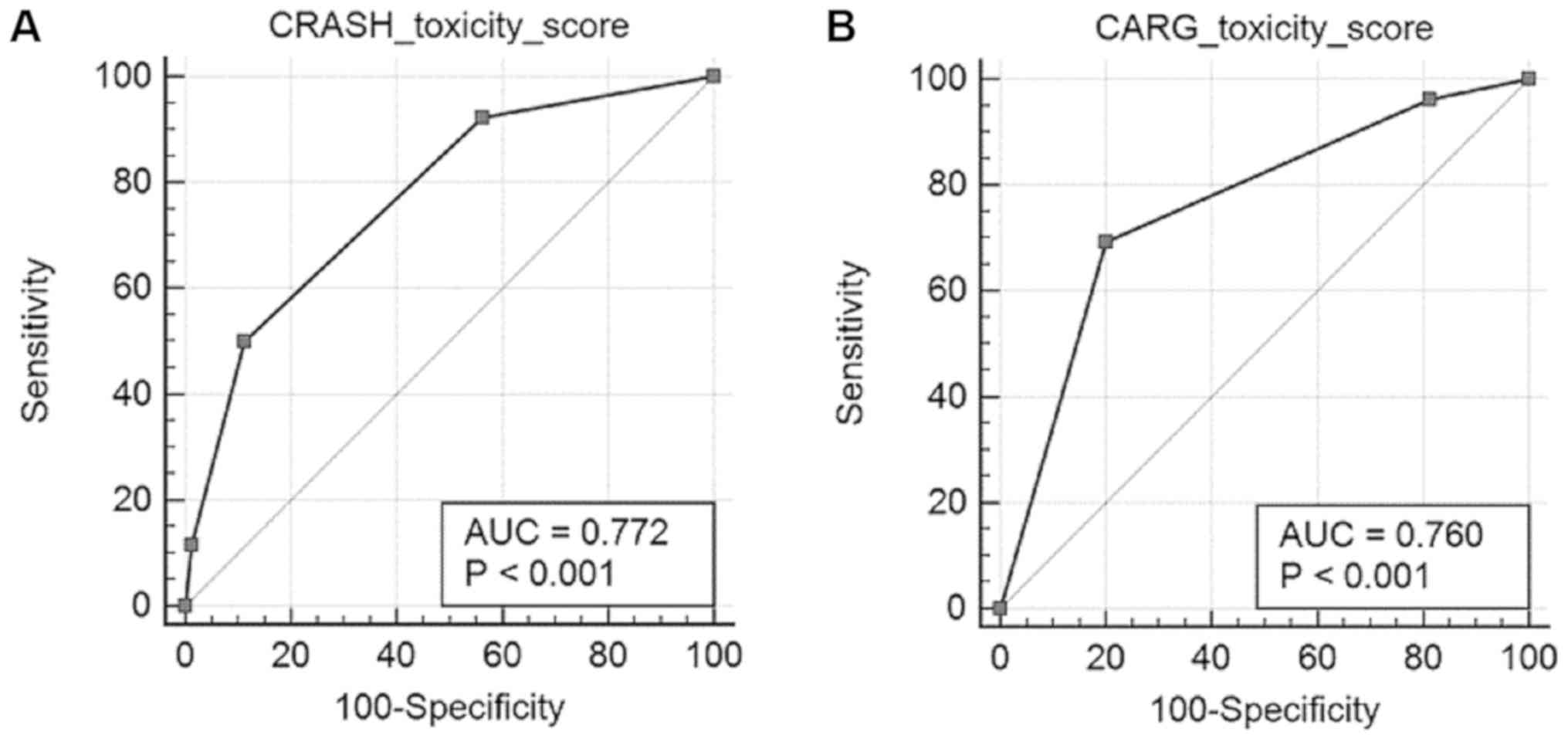|
1
|
Siegel RL, Miller KD and Jemal A: Cancer
Statistics, 2017, 2017. CA Cancer J Clin. 67:7–30. 2017. View Article : Google Scholar : PubMed/NCBI
|
|
2
|
Altekruse SF, Kosary CL, Krapcho M, Neyman
N, Aminou R, Waldron W, Ruhl J, Howlader N, Tatalovich Z, Cho H, et
al: SEER Cancer Statistics Review, 1975–2007: National Cancer
Institute. Based on November 2009 SEER data submission, posted to
the SEER web site, Bethesda MD 2010.
|
|
3
|
Smith BD, Smith GL, Hurria A, Hortobagyi
GN and Buchholz TA: Future of cancer incidence in the United
States: Burdens upon an aging, changing nation. J Clin Oncol.
27:2758–2765. 2009. View Article : Google Scholar : PubMed/NCBI
|
|
4
|
Talarico L, Chen G and Pazdur R:
Enrollment of elderly patients in clinical trials for cancer drug
registration: A 7-year experience by the us food and drug
administration. J Clin Oncol. 22:4626–4631. 2004. View Article : Google Scholar : PubMed/NCBI
|
|
5
|
Balducci L.: Management of cancer in the
elderly. Oncology (Williston Park). 20:135–143. 2006.PubMed/NCBI
|
|
6
|
Wildiers H, Heeren P, Puts M, Topinkova E,
Janssen-Heijnen ML, Extermann M, Falandry C, Artz A, Brain E,
Colloca G, et al: International society of geriatric oncology
consensus on geriatric assessment in older patients with cancer. J
Clin Oncol. 32:2595–2603. 2014. View Article : Google Scholar : PubMed/NCBI
|
|
7
|
Hurria A, Togawa K, Mohile SG, Owusu C,
Klepin HD, Gross CP, Lichtman SM, Gajra A, Bhatia S, Katheria V, et
al: Predicting chemotherapy toxicity in older adults with cancer: A
prospective multicenter study. J Clin Oncol. 29:3457–3465. 2011.
View Article : Google Scholar : PubMed/NCBI
|
|
8
|
Chrischilles EA, Pendergast JF, Kahn KL,
Wallace RB, Moga DC, Harrington DP, Kiefe CI, Weeks JC, West DW,
Zafar SY and Fletcher RH: Adverse events among the elderly
receiving chemotherapy for advanced non-small-cell lung cancer. J
Clin Oncol. 28:620–627. 2010. View Article : Google Scholar : PubMed/NCBI
|
|
9
|
Verger E, Salamero M and Conill C: Can
Karnofsky performance status be transformed to the Eastern
cooperative oncology group scoring scale and vice versa. Eur J
Cancer 28A. 1328–1330. 1992. View Article : Google Scholar
|
|
10
|
Pal SK, Katheria V and Hurria A:
Evaluating the older patient with cancer: Understanding frailty and
the geriatric assessment. CA Cancer J Clin. 60:120–132. 2010.
View Article : Google Scholar : PubMed/NCBI
|
|
11
|
Mohile SG, Velarde C, Hurria A, Magnuson
A, Lowenstein L, Pandya C, O'Donovan A, Gorawara-Bhat R and Dale W:
Geriatric assessment-guided care processes for older adults: A
delphi consensus of geriatric oncology experts. J Natl Compr Canc
Netw. 13:1120–1130. 2015. View Article : Google Scholar : PubMed/NCBI
|
|
12
|
Almodovar T, Teixeira E, Barroso A, Soares
M, Queiroga HJ, Cavaco-Silva J and Barata F: Elderly patients with
advanced NSCLC: The value of geriatric evaluation and the
feasibility of CGA alternatives in predicting chemotherapy
toxicity. Pulmonology. 25:40–50. 2019. View Article : Google Scholar : PubMed/NCBI
|
|
13
|
Extermann M, Boler I, Reich RR, Lyman GH,
Brown RH, DeFelice J, Levine RM, Lubiner ET, Reyes P, Schreiber FJ
III and Balducci L: Predicting the risk of chemotherapy toxicity in
older patients: The chemotherapy risk assessment scale for high-age
patients (CRASH) score. Cancer. 118:3377–3386. 2012. View Article : Google Scholar : PubMed/NCBI
|
|
14
|
Li D, Soto-Perez-de-Celis-E and Hurria A:
Geriatric assessment and tools for predicting treatment toxicity in
older adults with cancer. Cancer J. 23:206–210. 2017. View Article : Google Scholar : PubMed/NCBI
|
|
15
|
National Cancer Institute Common
Terminology Criteria for Adverse Events (CTCAE). version 3.0.
2006.
|
|
16
|
Harrell Jr FE Jr: Multivariable modeling
strategiesHarrell FE Jr: Regression modeling strategies: With
applications to linear models, logistic regression and survival
analysis. Springer series in statistics New York, Springer-Verlag;
pp. 53–86. 2001, View Article : Google Scholar
|
|
17
|
Hurria A and Lichtman SM: Clinical
pharmacology of cancer therapies in older adults. Br J Cancer.
98:517–522. 2008. View Article : Google Scholar : PubMed/NCBI
|
|
18
|
Ibrahim NK, Frye DK, Buzdar AU, Walters RS
and Hortobagyi GN: Doxorubicin-based chemotherapy in elderly
patients with metastatic breast cancer. Tolerance and outcome. Arch
Intern Med. 156:882–888. 1996. View Article : Google Scholar : PubMed/NCBI
|
|
19
|
Giovanazzi-Bannon S, Rademaker A, Lai G
and Benson AB III: Treatment tolerance of elderly cancer patients
entered onto phase II clinical trials: An Illinois cancer center
study. J Clin Oncol. 12:2447–2452. 1994. View Article : Google Scholar : PubMed/NCBI
|
|
20
|
Newcomb PA and Carbone PP: Cancer
treatment and age: Patient perspectives. J Natl Cancer Inst.
85:1580–1584. 1993. View Article : Google Scholar : PubMed/NCBI
|
|
21
|
Lichtman SM, Wildiers H, Chatelut E, Steer
C, Budman D, Morrison VA, Tranchand B, Shapira I and Aapro M;
International Society of Geriatric Oncology Chemotherapy Taskforce,
: International society of geriatric oncology chemotherapy
taskforce: Evaluation of chemotherapy in older patients-an analysis
of the medical literature. J Clin Oncol. 25:1832–1843. 2007.
View Article : Google Scholar : PubMed/NCBI
|
|
22
|
Früh M, Rolland E, Pignon JP, Seymour L,
Ding K, Tribodet H, Winton T, Le Chevalier T, Scagliotti GV,
Douillard JY, et al: Pooled analysis of the effect of age on
adjuvant cisplatin-based chemotherapy for completely resected
non-small-cell lung cancer. J Clin Oncol. 26:3573–3581. 2008.
View Article : Google Scholar : PubMed/NCBI
|
|
23
|
Bray F, Ferlay J, Soerjomataram I, Siegel
RL, Torre LA and Jemal A: Global cancer statistics 2018: GLOBOCAN
estimates of incidence and mortality worldwide for 36 cancers in
185 countries. CA Cancer J Clin. 68:394–424. 2018. View Article : Google Scholar : PubMed/NCBI
|
|
24
|
Chen J, Hao X, Cheng F, Zhang T, Xing P
and Li J: Clinicopathologic characteristics of the patients in the
elderly lung carcinoma. Zhongguo Fei Ai Za Zhi 19 (Chinese).
19:675–678. 2016.(In Chinese).
|
|
25
|
Arriagada R, Bergman B, Dunant A, Le
Chevalier T, Pignon JP and Vansteenkiste J; International Adjuvant
Lung Cancer Trial Collaborative Group, : Cisplatin-based adjuvant
chemotherapy in patients with completely resected non-small-cell
lung cancer. N Engl J Med. 350:351–360. 2004. View Article : Google Scholar : PubMed/NCBI
|
|
26
|
Douillard JY, Rosell R, De Lena M,
Carpagnano F, Ramlau R, Gonzáles-Larriba JL, Grodzki T, Pereira JR,
Le Groumellec A, Lorusso V, et al: Adjuvant vinorelbine plus
cisplatin versus observation in patients with completely resected
stage IB-IIIA non-small-cell lung cancerstage [Adjuvant Navelbine
International Trialist Association (ANITA)]: A randomised
controlled trial. Lancet Oncol. 7:719–727. 2006. View Article : Google Scholar : PubMed/NCBI
|
|
27
|
Kreuter M, Vansteenkiste J, Fischer JR,
Eberhardt W, Zabeck H, Kollmeier J, Serke M, Frickhofen N, Reck M,
Engel-Riedel W, et al: Randomized phase 2 trial on refinement of
early-stage NSCLC adjuvant chemotherapy with cisplatin and
pemetrexed versus cisplatin and vinorelbine: The TREAT study. Ann
Oncol. 24:986–992. 2013. View Article : Google Scholar : PubMed/NCBI
|
|
28
|
Quoix E, Zalcman G, Oster JP, Westeel V,
Pichon E, Lavolé A, Dauba J, Debieuvre D, Souquet PJ, Bigay-Game L,
et al: Carboplatin and weekly paclitaxel doublet chemotherapy
compared with monotherapy in elderly patients with advanced
non-small-cell lung cancer: IFCT-0501 randomized, phase 3 trial.
Lancet. 378:1079–1088. 2011. View Article : Google Scholar : PubMed/NCBI
|
|
29
|
Bergen G, Stevens MR and Burns ER: Falls
and fall injuries among adults aged ≥65 Years-United States, 2014.
MMWR Morb Mortal Wkly Rep. 65:993–998. 2016. View Article : Google Scholar : PubMed/NCBI
|
|
30
|
Stone CA, Lawlor PG, Savva GM, Bennett K
and Kenny RA: A prospective study of falls and risk factors for
falls in adults with advanced cancer. J Clin Oncol. 30:2128–2133.
2012. View Article : Google Scholar : PubMed/NCBI
|
|
31
|
Tofthagen C, Overcash J and Kip K: Falls
in persons with chemotherapy-induced peripheral neuropathy. Support
Care Cancer. 20:583–589. 2012. View Article : Google Scholar : PubMed/NCBI
|
|
32
|
Puts MT, Monette J, Girre V, Wolfson C,
Monette M, Batist G and Bergman H: The fall rate of older
community-dwelling cancer patients. Support Care Cancer.
21:775–783. 2013. View Article : Google Scholar : PubMed/NCBI
|
|
33
|
Naeim A and Reuben D: Geriatric syndromes
and assessment in older cancer patients. Oncology (Williston Park).
15:1567–1591. 2001.PubMed/NCBI
|
|
34
|
Luciani A, Biganzoli L, Colloca G, Falci
C, Castagneto B, Floriani I, Battisti N, Dottorini L, Ferrari D,
Fiduccia P, et al: Estimating the risk of chemotherapy toxicity in
older patients with cancer: The role of the Vulnerable elders
survey-13 (VES-13). J Geriatr Oncol. 6:272–279. 2015. View Article : Google Scholar : PubMed/NCBI
|
|
35
|
Sylvester RK, Steen P, Tate JM, Mehta M,
Petrich RJ, Berg A and Kolesar J: Temozolomide-induced severe
myelosuppression: Analysis of clinically associated polymorphisms
in two patients. Anticancer Drugs. 22:104–110. 2011. View Article : Google Scholar : PubMed/NCBI
|
|
36
|
Giacalone A, Quitadamo D, Zanet E,
Berretta M, Spina M and Tirelli U: Cancer-related fatigue in the
elderly. Support Care Cancer. 21:2899–2911. 2013. View Article : Google Scholar : PubMed/NCBI
|
|
37
|
Alibhai SM, Aziz S, Manokumar T,
Timilshina N and Breunis H: A comparison of the CARG tool, the
VES-13, and oncologist judgment in predicting grade 3+ toxicities
in men undergoing chemotherapy for metastatic prostate cancer. J
Geriatr Oncol. 8:31–36. 2017. View Article : Google Scholar : PubMed/NCBI
|
|
38
|
Nie X, Liu D, Li Q and Bai C: Predicting
chemotherapy toxicity in older adults with lung cancer. J Geriatr
Oncol. 4:334–339. 2013. View Article : Google Scholar : PubMed/NCBI
|
|
39
|
Moth EB, Kiely BE, Stefanic N, Naganathan
V, Martin A, Grimison P, Stockler MR, Beale P and Blinman P:
Predicting chemotherapy toxicity in older adults: Comparing the
predictive value of the CARG toxicity score with oncologists'
estimates of toxicity based on clinical judgement. J Geriatr Oncol.
10:202–209. 2019. View Article : Google Scholar : PubMed/NCBI
|



















